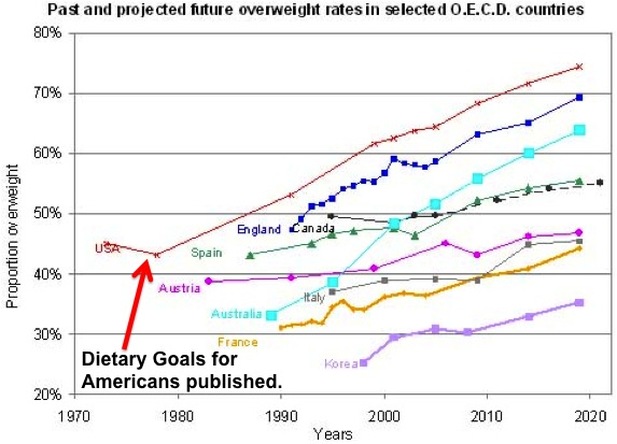“In fact, because I recognize many will read or hear only about the Dietary Goals….I feel the American public would be in a better position to exercise freedom of dietary choice if it were stated in bold print on the Goals and Food Selection pages that the value of dietary change remains controversial. And that science cannot at this time insure that an altered diet will provide protection from certain killer diseases such as heart disease and cancer…I recognize the desirability of providing dietary guidance to the public ... In my judgment, however, the best way to do this is to fully inform the public not only about what is known, but also what remains controversial regarding cholesterol, the benefits of dietary change, and the reliability of food intake data. Only then, will it be possible for individual consumers to respond optimally to the Dietary Goals in this report.”
-Charles H Percy, Ranking Minority Member, 1977
These prophetic words were taken directly from the original Dietary Goals For Americans, published in 1977. Worried about the unintended consequences of dramatically changing the American diet, Mr. Percy voiced his concern in bold letters, urging the American people to carefully consider the scientific controversy underlying the integrity of these recommendations before accepting them as fact.
Without knowing what was in store for our health, the next 35 years would see the most unprecedented rise in obesity and diabetes our world has ever seen.
Since the guidelines have become policy, doctors and dietitians all over the country have been blindly recommending the diet given to us by the USDA, based on the assumption that there is overwhelming clinical support. Anyone who even questions the veracity of these recommendations is simply ill informed and likely a profit-seeking quack promulgating his late night television pseudoscience. These same doctors and dietitians have seen the largest rise in obesity and diabetes ever. There are two major explanations for this: either Americans aren't listening, or the information is wrong.
My question is simple: After 35 years, are there any randomized clinical trials demonstrating that a low fat, high carbohydrate diet is more effective than a low carbohydrate, calorie unlimited diet to lose and/or maintain your weight?
If doctors are expected to practice evidence based medicine, prescribing drugs and performing procedures supported by the largest body of clinical evidence, then surely the same should apply for diet. There are at least 14 randomized clinical trials refuting the use of a low fat diet as the standard of care. Where are those supporting it?
Challenge to the World
The challenge is simple:
1. Find clinical trials supporting today's standard of care as compared to a low carbohydrate diet. A randomized control trial in which a calorie-restricted, low fat, diet results in more weight loss than a calorie-unlimited, low carbohydrate diet (more).
2. Submit them by email to [email protected].
3. Donate to the pot and increase the stakes.
After six months, the person(s) who find such trials will win a percentage of the donation pot. 100% of the remaining money will be donated to the Nutrition Science Initiative.
Donate and Share
If you want to help our efforts and contribute to a better understanding of how food affects our health, then:
1. Share this post on facebook and twitter
2. Head over to our challenge page and donate. Even $1 would be helpful.

 RSS Feed
RSS Feed
